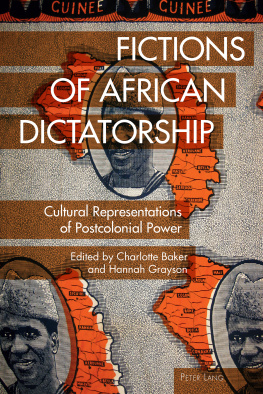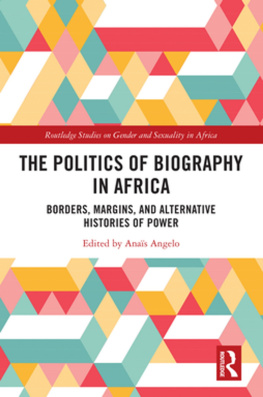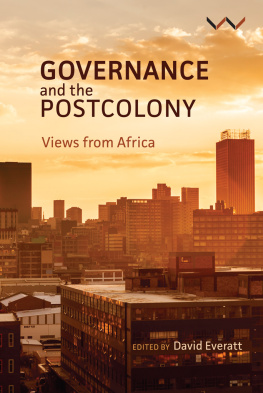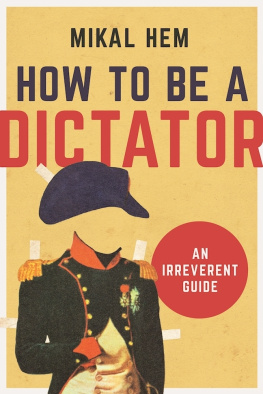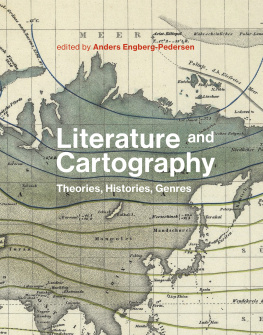RACE AND RESISTANCE ACROSS BORDERS IN THE LONG TWENTIETH CENTURY
Volume 4
Series Editors:
Tessa Roynon, University of Oxford (Executive Editor)
Elleke Boehmer, University of Oxford
Victoria Collis-Buthelezi, University of the Witwatersrand
Patricia Daley, University of Oxford
Aaron Kamugisha, University of the West Indies, Cave Hill
Minkah Makalani, University of Texas, Austin
Hlne Neveu Kringelbach, University College London
Stephen Tuck, University of Oxford

PETER LANG
Oxford Bern Berlin Bruxelles New York Wien
FICTIONS OF AFRICAN DICTATORSHIP
Cultural Representations of Postcolonial Power
Edited by Charlotte Baker
and Hannah Grayson

PETER LANG
Oxford Bern Berlin Bruxelles New York Wien
Bibliographic information published by Die Deutsche Nationalbibliothek.
Die Deutsche Nationalbibliothek lists this publication in the Deutsche Nationalbibliografie; detailed bibliographic data is available on the Internet at http://dnb.d-nb.de.
A catalogue record for this book is available from the British Library.
Library of Congress Cataloging-in-Publication Data
Names: Baker, Charlotte, 1976- editor. | Grayson, Hannah, editor.
Title: Fictions of African dictatorship : cultural representations of
postcolonial power / Charlotte Baker and Hannah Grayson.
Description: New York : Peter Lang, 2018. | Includes bibliographical
references and index.
Identifiers: LCCN 2018009167 | ISBN 9781787076815 (alk. paper)
Subjects: LCSH: African literature--20th century--History and criticism. |
Dictators in literature. | Dictators--Africa.
Classification: LCC PL8010 .F449 2018 | DDC 809.896--dc23 LC record available at https://lccn.loc.gov/2018009167
Classification: LCC PR878.I49 D38 2017 | DDC 823/.80936--dc23 LC record available at https://lccn.loc.gov/2017007737
 | An electronic version of this book is freely available, thanks to the support of libraries working with Knowledge Unlatched. KU is a collaborative initiative designed to make high quality books Open Access for the public good. More information about the initiative and links to the Open Access version can be found at www.knowledgeunlatched.org |
Cover image: Commemorative wraps (pagnes) printed on wax fabric in the 1960s depicting Ahmed Sekou Tour. Made in England for the Guinean market. Courtesy of Thomas Miles. The fabric exemplifies the reproduction of authoritarian imagery critiqued by Achille Mbembe and discussed in Part I of this volume.
Cover design: Olaf Gloeckler, Atelier Platen, Friedberg
ISBN 2297-2552 DOI 10.3726/b11381
ISBN 978-1-78707-681-5 (print) ISBN 978-1-78707-682-2 (ePDF)
ISBN 978-1-78707-683-9 (ePub) ISBN 978-1-78707-684-6 (mobi)
Open Access: This work is licensed under a Creative Commons Attribution
CC-BY 4.0 license. To view a copy of this license, visit
https://creativecommons.org/licenses/by/4.0/

Peter Lang AG 2018
Published by Peter Lang Ltd, International Academic Publishers,
52 St Giles, Oxford, OX1 3LU, United Kingdom
oxford@peterlang.com, www.peterlang.com
Charlotte Baker and Hannah Grayson have asserted their right under the Copyright, Designs and Patents Act, 1988, to be identified as Editors of this Work.
This publication has been peer reviewed.
viii | 1
Since the rise to power of autocratic leaders across Africa in the early years of independence, artists, filmmakers, novelists, poets, photographers and song-writers have been preoccupied with the compelling figure of the dictator, placing him at centre stage in their work. Their concern with the question of dictatorship requires little speculation, for African dictators and their regimes have defined the postcolonial period in Africa. Within a decade of independence, nearly all African states had evolved into dictatorships or single-party regimes, and the consequences of their autocratic regimes are still felt across the African continent today. Christopher Miller points to the irony that, having demanded nationhood, Africans found themselves subject to nationalism of quite a different sort: The arbitrary borders between African states, which had been ignored or critiqued [] by the theory of Pan-African nationalism, were reasserted as the armatures of a more familiar state nationalism at the service of new elites. Instead, he contends, power and rhetoric are bound up and cannot exist independently of one another.
The Latin American dictator novel has received considerable critical attention, with some critics asserting it as a genre that is specific to Latin 1 | 2 Drawing on the work of Achille Mbembe, Nganang describes dictatorship novels as texts that lay bare the tragedy of dictatorships which leave little room for opposition. As Mbembe explains in On the Postcolony:
[In] the postcolonial historical trajectory, the authoritarian mode can no longer be interpreted strictly in terms of surveillance, or the politics of coercion. The practices of ordinary citizens cannot always be read in terms of opposition to the state, deconstructing power and disengagement. In the postcolony, an intimate tyranny links the rulers with the ruled []. If subjection appears more intense than it might be, this is because the subjects of the commandement have internalized authoritarian 2 | 3
For Mbembe, the very intimacy of tyranny is precisely what prevents resistance, entangling as it does the ruler and the ruled within a convivial space.
Unlike the Latin American dictator novel, the African dictator novel genre remains under-discussed by scholars, and only a few works, including Nuruddin Farahs trilogy of novels Variations on the Theme of an African Dictatorship (19801983) and Ngg wa Thiongos Wizard of the Crow (2007) have received significant critical attention. Mugabes recently ended thirty-seven-year reign in Zimbabwe; we hope in turn that this volume will lead to further investigations in these areas. Some contributions, such as Mari and Solis chapter on diaspora, explicitly state the transnational focus this volume establishes, in order to point to the wider global significance of dictatorship. The collection of essays highlights both the creative potential and the expansive nature of African cultural space. Styles, tropes and concerns vary across borders, but also recur in strikingly similar ways from context to context, indicating that writing the dictator remains a transnational project. Importantly, this forms part of a wider transnational move among African writers and critics to wrest control of African representation and memory for themselves. Within this, Fictions of African Dictatorship includes studies of a number of lesser-known fictional representations of dictatorship, including works by In Koli Jean Bofane, Eric Sibanda, and Tiyambe Zeleza alongside high-profile figures such as Ngg wa Thiongo and Ahmadou Kourouma.
The volumes attention to the multiple intersections between fiction and dictatorship necessarily raises questions about the efficacy of fictional representation as a mode of representing and resisting authoritarianism. Several contributors point to the strategies employed by dictators to fictionalize their own representations in order to portray a particular image of themselves, while others focus on the potential of art to interrogate the performance of dictatorship. While the authors of some chapters focus on the aesthetic techniques used to circumvent censorship or to operate political critique, others bring the question of language to the fore, pointing to its central importance in depicting and contesting regimes built on discourses of unanimity and exclusion. Far from drowning everything out, here these tirades find themselves creatively manipulated in textual form: with satire or irony. Fiction is also examined as a potential space of resistance, a space in which alternative versions and visions of reality can be presented. The range of writing here in turn challenges any fiction that experiences of power and politics across the African continent are uniform. As such, contributors interrogate the multiple, intersecting layers of fiction in a diverse range of real and literary spaces, which include the visible and aesthetic, the linguistic and discursive. 4 | 5

